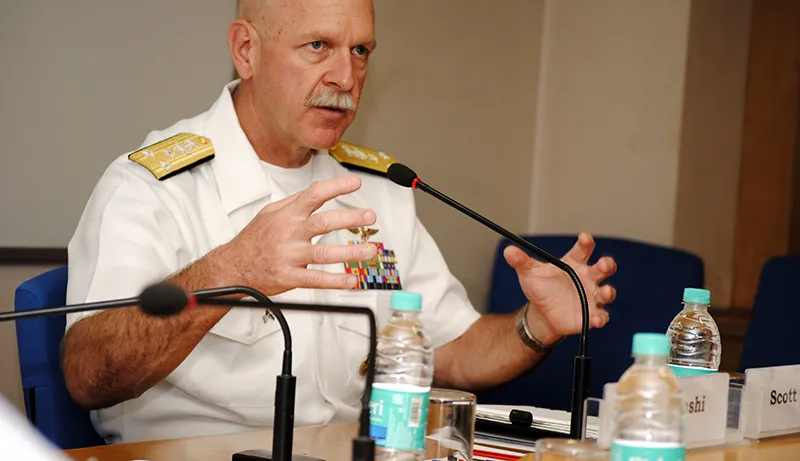Commander of the US Seventh Fleet, Vice Admiral Scott H. Swift, feels that dialogues and frank discussions are the best solution to the ongoing disputes in the Indo-Pacific region.

Commander of the US Seventh Fleet, Vice Admiral Scott H. Swift, feels that dialogues and frank discussions are the best solution to the ongoing disputes in the Indo-Pacific region.
Vice Admiral Scott H. Swift said this while participating in an interaction recently at Observer Research Foundation.
One of the major assignments now of the Seventh fleet, the largest of the forward deployed U.S Fleets, comprising 60 to 70 ships, 300 aircraft and 40,000 navy and Marine Corps personnel, is the defence of the Korean Peninsula, a task which seems crucial in context of the growing tensions in the North East Asian region.
The discussion at ORF, which was attended by many retired Indian naval officers and maritime specialists, started off with the Admiral emphasising the importance of the Indo-Pacific region, which is reflected by the fact that 5 of the US’s 7 Treaty Allies are resident here.
Admiral Swift also stressed on the need for nations to work within the existing framework of international norms, standards, rules and laws to resolve differences. This was discussed in the backdrop of the move by the Philippines to submit to the UN tribunal its maritime disputes with China.
It was noted that the ability to approach international court empowers weaker nations in the disputes, and facilitates dialogue. The concern is that the lack of dialogue on matters might lead to the use of force which would be counter-productive for the nations directly involved, and the region as a whole.
It was established that no one seeks conflict in the region but there are multiple dynamics at play which may alter the situation. The probability of a conflict is very low, but the consequences of a conflict in this vital region would be high and felt globally.
It was discussed that the role of the military is to provide security, but that security is only useful to the extent that it fosters the stability that enables prosperity for the region’s nations. The best way ahead is a joint effort with a combined focus with organisations such as the Association of South East Asian Nations (ASEAN).
Furthermore, two main concerns in the area were identified as the lack of clarity regarding North Korea and the challenge that the region is facing in accommodating an emerging China. The steps that should be taken in the face of the recent nuclear threats by North Korea were also explored during the meeting. The unpredictability of the North Korean Government makes the situation very serious.
The main focus now should be on how to de-escalate the situation in the region. It is imperative that the concerned nations follow international laws and standards to avoid further aggravating the tension. A policy based approach must be adopted to facilitate dialogue and discussions amongst the disputing countries.
The event was attended by maritime security experts and other members of the strategic community, apart from the ORF faculty.
(This report was prepared by Darshana M. Baruah, Research Intern, Observer Research Foundation)
The views expressed above belong to the author(s). ORF research and analyses now available on Telegram! Click here to access our curated content — blogs, longforms and interviews.
